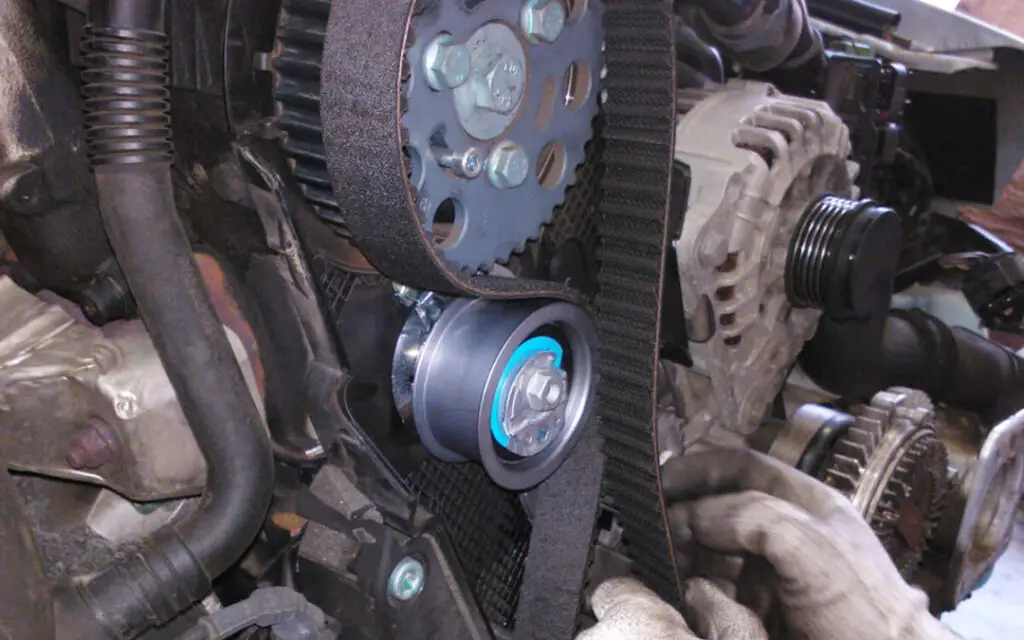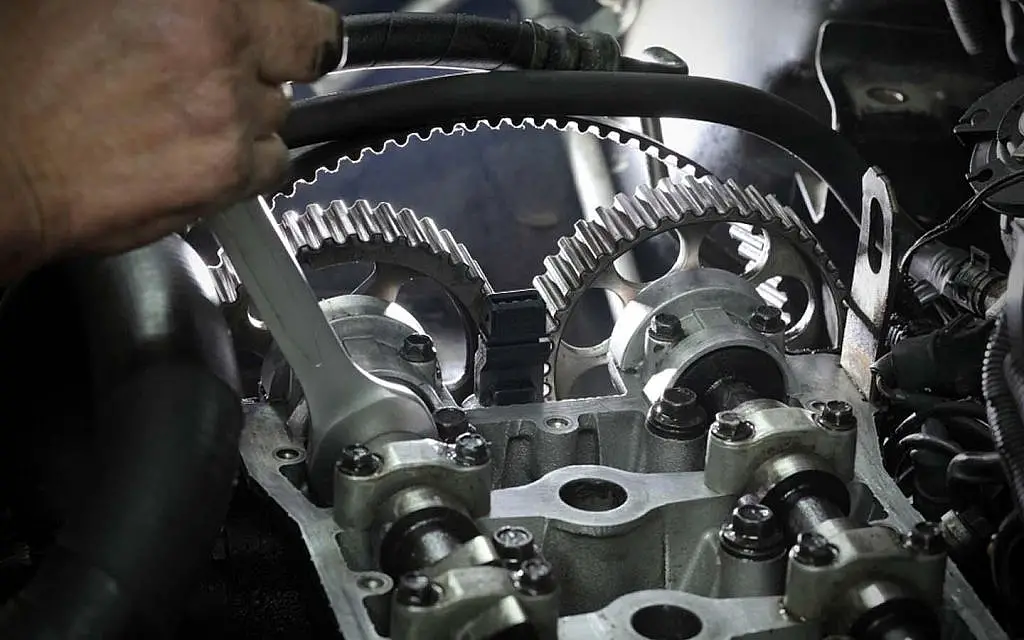Timing belt noise, like squealing or grinding, often indicates wear or misalignment. Ignoring it can lead to engine damage, so prompt inspection and repair are crucial.
The timing belt is an important component in the engine of a car, responsible for ensuring that the camshaft and crankshaft rotate in sync. This synchronization is vital for the proper functioning of the engine, as it controls the opening and closing of engine valves. A well-maintained timing belt can last for many years and thousands of miles, but when it starts making noise, it can signal trouble.
In this blog post, we’ll explore the causes, consequences, and solutions for timing belt noise, along with answers to some frequently asked questions.

Contents
What Causes Timing Belt Noise?
There are several reasons why a timing belt might start making noise. Identifying the source of the noise is critical to prevent further damage to the engine.
1. Worn or Loose Timing Belt
One of the most common causes of timing belt noise is a worn or loose timing belt. Over time, the belt can stretch or wear out, causing it to slip or rub against other engine components. This can result in a squealing, whining, or grinding noise, especially when the engine is running at high speeds. A loose timing belt may also cause the engine to run unevenly, affecting its performance.
2. Misaligned Timing Components
If the timing components, such as the camshaft and crankshaft gears or pulleys, become misaligned, it can cause the timing belt to make noise. This misalignment can occur due to improper installation, worn-out pulleys, or damage to the gears. Misalignment can lead to the timing belt rubbing against components it shouldn’t, creating friction and producing noise.
3. Faulty Tensioner or Pulley
The tensioner and pulley system is responsible for keeping the timing belt tight and properly aligned. If the tensioner or pulley becomes faulty or worn, it can cause the timing belt to become loose or misaligned. This can result in a variety of noises, including a high-pitched squeal, grinding, or rattling sound.
A faulty tensioner or pulley may also cause the timing belt to slip, further exacerbating the noise and potentially leading to engine damage.
4. Contamination or Debris
In some cases, the timing belt noise may be caused by contamination or debris that gets lodged in the belt. Dirt, oil, or coolant leaks can create friction between the belt and the pulleys, leading to noise. In extreme cases, debris can cause the timing belt to break or become damaged, leading to catastrophic engine failure.
5. Damaged Timing Belt Teeth
The teeth on the timing belt play a crucial role in maintaining proper synchronization between the crankshaft and camshaft. If the teeth become worn or damaged, the timing belt may slip or fail to engage properly with the gears. This can result in a clicking or clanking sound, and if not addressed promptly, it can lead to the engine’s timing being thrown off completely.
What Are the Consequences of Ignoring Timing Belt Noise?
Timing belt noise should never be ignored, as it can indicate serious issues that may affect the overall health of the engine. If left unaddressed, the consequences can be severe and expensive to repair. Here are some of the risks associated with ignoring timing belt noise:
1. Engine Misfire
A timing belt that is worn or misaligned can cause the engine’s valves to open and close at the wrong times. This can lead to an engine misfire, resulting in poor performance, reduced fuel efficiency, and increased emissions. In severe cases, engine misfire can cause damage to the pistons, cylinders, and other components.
2. Complete Engine Failure
If the timing belt breaks or becomes severely damaged, it can cause a complete engine failure. This is especially true for interference engines, where the pistons and valves occupy the same space. In these engines, if the timing belt fails, the pistons and valves can collide, resulting in bent valves, damaged pistons, and a need for costly repairs or even a full engine replacement.
3. Increased Repair Costs
The longer you wait to address timing belt noise, the more likely it is that the problem will escalate. A small issue, such as a loose timing belt, can quickly turn into a larger problem if left unchecked. For example, a worn-out timing belt may damage other components, such as the pulleys, tensioner, or water pump, leading to higher repair costs.
4. Reduced Engine Performance
A faulty timing belt can lead to a decrease in engine performance. This may manifest as rough idling, sluggish acceleration, or a decrease in overall power. Over time, the engine’s efficiency will continue to decline, leading to poor fuel economy and an increased likelihood of breakdowns.
How to Fix Timing Belt Noise
If you hear timing belt noise, it’s important to take action as soon as possible to prevent further damage. Here are some steps you can take to fix the issue:
1. Inspect the Timing Belt
The first step in addressing timing belt noise is to inspect the timing belt for any signs of wear, cracks, or damage. If the belt appears worn or frayed, it may need to be replaced. If the belt is loose, it may require tensioning or realignment.
2. Check the Tensioner and Pulley
Next, check the tensioner and pulley system for any signs of wear or damage. If the tensioner is not keeping the timing belt properly tensioned, it may need to be replaced. Similarly, if the pulleys are worn or misaligned, they should be replaced or realigned.
3. Check for Contamination or Debris
Inspect the timing belt and surrounding components for any signs of contamination or debris. Clean the area and remove any dirt, oil, or coolant leaks that may be causing friction between the belt and pulleys.
4. Replace the Timing Belt if Necessary
If the timing belt is severely worn or damaged, it may need to be replaced entirely. Replacing the timing belt is a labor-intensive job, and it’s often recommended to replace other components, such as the tensioner, pulleys, and water pump, at the same time to ensure the engine runs smoothly.

Frequently Asked Questions
Here are some FAQs about timing belt noise –
1. How do I know if my timing belt is making noise?
Common signs of timing belt noise include squealing, whining, grinding, or clicking sounds coming from the engine. If you notice any of these noises, it’s important to have your timing belt inspected immediately.
2. Can I drive with a noisy timing belt?
Driving with a noisy timing belt is not recommended, as it can indicate that there is a serious issue with the timing components. Ignoring the noise can lead to engine misfire, damage, or even complete engine failure.
3. How long does a timing belt last?
A timing belt typically lasts between 60,000 and 100,000 miles, depending on the make and model of the vehicle. However, it’s important to follow the manufacturer’s recommendations for replacement intervals.
4. Can a timing belt make noise if it’s too tight?
Yes, if the timing belt is too tight, it can create excess friction, leading to noise and potential damage to the belt and other components. A properly tensioned timing belt is essential for smooth engine operation.
5. What happens if the timing belt breaks while driving?
If the timing belt breaks while driving, the engine will lose its ability to synchronize the crankshaft and camshaft, causing a loss of power. In interference engines, the pistons and valves may collide, resulting in severe engine damage.
Conclusion
Timing belt noise is an important warning sign that should never be ignored. Whether caused by wear, misalignment, a faulty tensioner, or debris, addressing the issue promptly can prevent costly repairs and engine failure.